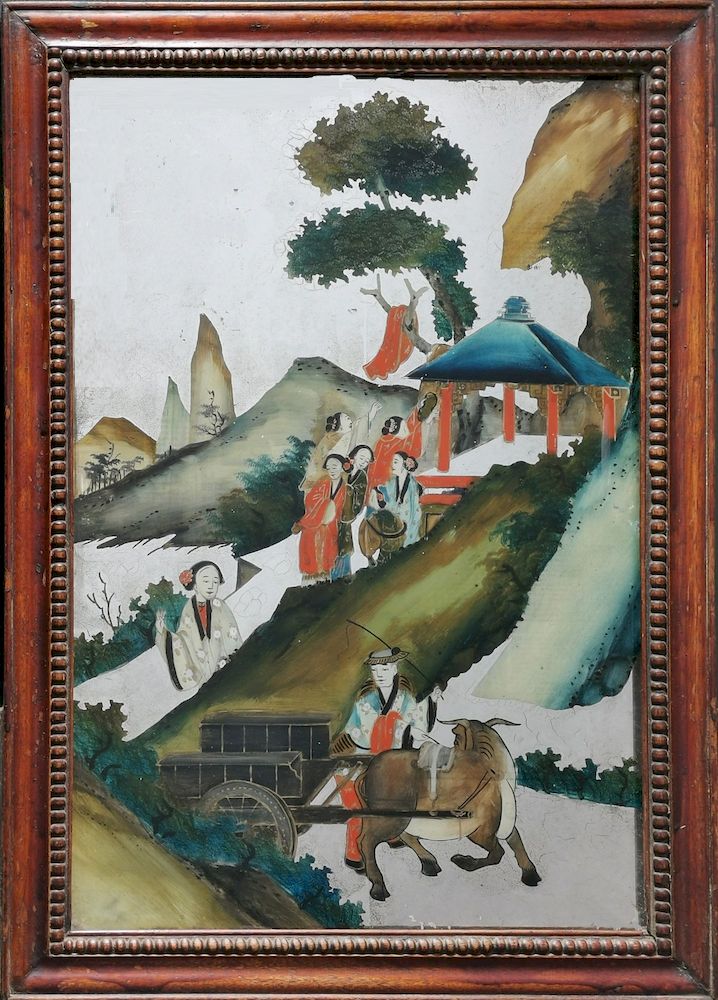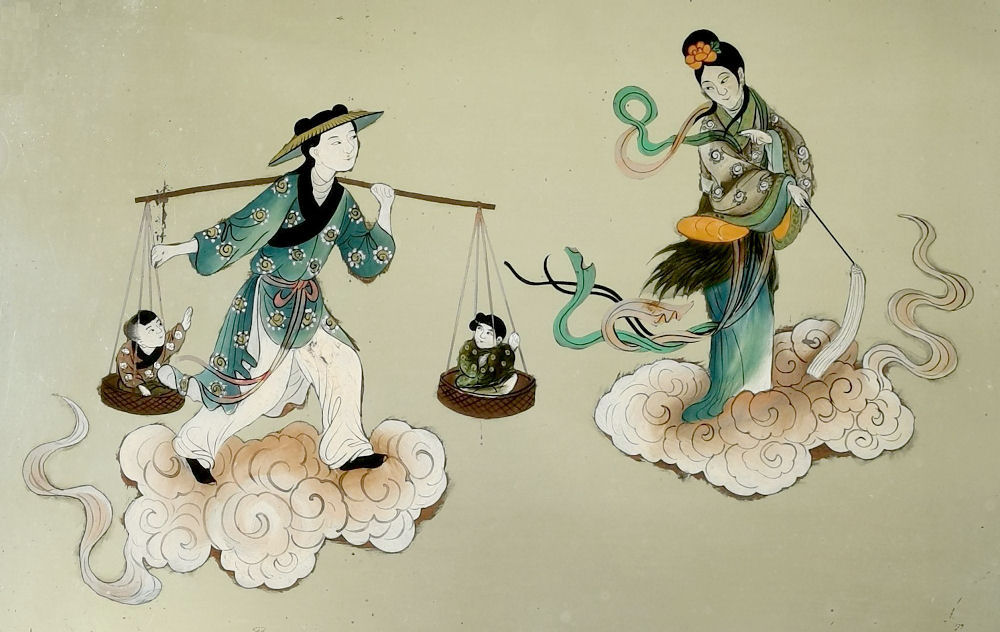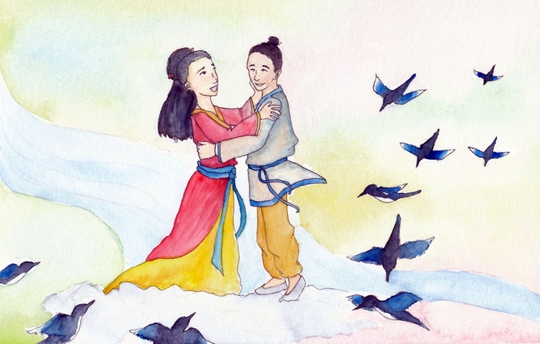 “When the sisters spotted him, six of them hurried to put on their clothes.”
“When the sisters spotted him, six of them hurried to put on their clothes.”
(Reverse Glass Painting from the Mei Lin Collection [Rupprecht Mayer and Haitang Mayer-Liem])"
The Queen Mother of the West = a goddess
Weaving Maid = a celestial maiden in service to the Queen Mother of the West
Cowherd = a mortal cowherd, with whom celestial maidens ought not to fall in love
The beautiful and charming Weaving Maid (Zhīnǚ 织女) was a servant in the celestial palace of the Queen Mother of the West (Xī Wángmǔ 西王母), where she spent her days weaving.
 “When the sisters spotted him, six of them hurried to put on their clothes.”
“When the sisters spotted him, six of them hurried to put on their clothes.”
Meanwhile on earth an amazingly handsome and hardworking Cowherd (Niúláng 牛郎) was miserably lonely. (Cows, it develops, do not make inspiring companions.) His parents had died when he was young, and he lived with his older brother and his brother’s wife, who were both very lazy and treated him as a servant.
It is not clear how the Cowherd came to the attention of the Weaving Maid. Some people say that she and her six sisters came to earth to bath in a refreshing stream, where the Cowherd saw them, was transfixed by their beauty, and picked up the clothes one of them had left on the bank.
When the sisters spotted him, six of them hurried to put on their clothes, turned into doves, and flew back to the realm of the Celestial Mother of the West. But, the Weaving Maid’s clothes were in his hand, and she had to beg to get them back. No-one knows quite how the negotiation proceeded, but by the end the Weaving Maid had fallen completely in love with the Cowherd. So rather than turn to a dove and fly back to the Celestial Mother, she remained in the world of mortals and married the Cowherd, and they even had two children.
The Queen Mother of the West seems not to have noticed initially, but when the affair came to her attention, she ordered her troops to abduct the Weaving Maid and escort her back to her celestial loom. The poor Cowherd tried to pursue them, but he had to carry the children, and in any case even a very determined mortal is unlikely to catch up with a force of celestial lictors However the Queen Mother did not want to take chances. Drawing a hairpin from her hair, she blew on it and instantly it turned into a heavenly river, the one we know today as the Milky Way, and it flowed forth between the Weaving Maid and the pursuing Cowherd.

Thus the earthly Cowherd and the heavenly Weaving Maid were separated forever, and their children cried piteously to the Queen Mother to reunite them with their mother. The Weaving Maid’s six sisters joined in the plea. Some people say that all nature was so moved by the tragedy, that a flock of magpies (què 鹊) miraculously appeared to form a bridge over the heavenly river, and that this sign of cosmic attention caused the Queen Mother of the West to relent. Others say that she relented because she was merciful, and called the magpies herself.
The Queen Mother allowed the lovers (and their children) to be reunited for one night every year, on the 7th night of the 7th lunar month. On that day each year, a flock of magical magpies suddenly appears and forms a bridge over the Milky Way, and the Weaving Maid and the Cowherd meet in the middle.

On the seventh day of the seventh lunar month, called the “festival of the seventh evening” (qīxījié 七夕节), girls hold weaving competitions in commemoration of the Weaving Maid, and formerly they offered sacrifices to the Weaving Maid, hoping to receive from her cleverness in doing beautiful needlework.
They would sacrifice fruits, which would be put out overnight. It was a very good omen if spiders came and spun webs over the fruit by morning. For that reason, the day is sometimes called the “Cleverness-Begging Festival” (qǐqiǎo jié 乞巧节). Or so it is said.
Some people say that the weaving maid became the star Vega (in the Western constellation Lyra) and that the Cowherd became the star Altair (in the western constellation Aquilla), and so if we look into the heavens at night we can see them dwelling there forever. Unless, of course, our view is obscured by clouds or unbelief.
Some people say that the Weaving Maid was a daughter or granddaughter of the Jade Emperor. Once she met the Cowherd, they say, she gave up sewing, which particularly irritated the Jade Emperor, and caused him to break up the union. But that probably confounds tale of this celestial maid falling in love with a mortal, with another one in which the seventh daughter of the lord of heaven marries the sixth filial exemplar, a man named DǑNG Yǒng, whose story is told elsewhere in this collection.